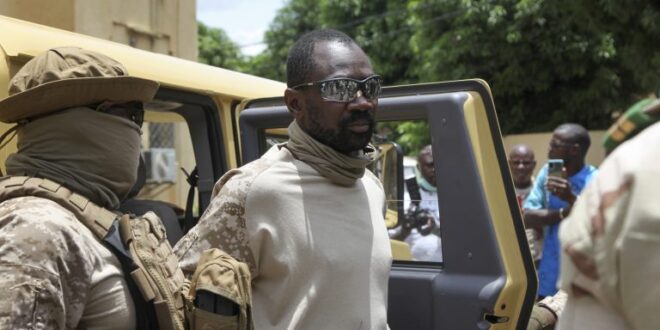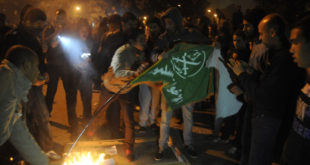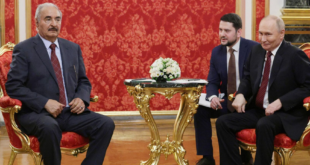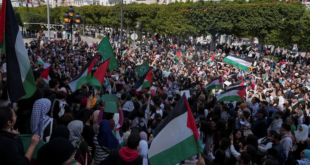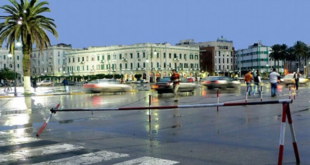Mali’s latest military coup appears to be a power play by high-ranking officers seeking to topple the Malian transitional government, itself brought on by a coup.
The second coup in Bamako in under a year highlights the fragility of Mali’s democracy and threatens the ongoing fight against a range of jihadist groups operating in the Sahel.
While Mali’s highest ranking military officers grapple for power, large swaths of the country in the north, including Gao, are falling to jihadists.
French President Emmanuel Macron denounced the coup and threatened sanctions against the coup leaders.
Just this week, high-ranking Malian military officers staged the second coup in the last nine months, overthrowing and detaining Mali’s recently installed interim civilian leadership. Coup leader Assimi Goita, who has served as Mali’s interim vice president following the August 2020 coup, suggested that Mali would still go ahead with elections in March 2022 as planned. Last August, Malian President Ibrahim Boubacar Keïta was seized by soldiers in a coup and brought to Kati military barracks outside Bamako, Mali’s capital. By nightfall, Keïta had resigned the presidency and within weeks departed Mali for the United Arab Emirates, ostensibly for medical purposes. In the wake of Keïta’s resignation, a National Committee for the Salvation of the People (CNSP) took over Mali’s leadership for an 18-month interim term and former Minister of Defence, Bah Ndaw, was selected as CNSP leader. But this week, Goita led a military coup to detain President Ndaw and Prime Minister Moctar Ouane citing violations of the transition agreement.
This is not the first challenge to the authority of the CNSP. Earlier this year, Ndaw decreed on January 18 that the CNSP would be dissolved, noting the challenges to the legitimacy of a transitional government effectively administering the country; yet, the CNSP remained in place. Moreover, the CNSP received criticism for being military-dominated and reflecting the corrupt practices that characterized Keïta’s government. Just before this week’s coup, Ndaw attempted to respond to concerns about the transitional government by removing some of its members, including another former Minister of Defence, Sadio Camara, and the former Minister of Security, Modibo Kone. Both individuals were instrumental in the August 2020 coup. It was in the context of these developments that Ndaw and PM Ouane were detained this week by soldiers and taken again to Kati military barracks. Early indications suggest that Camara, Kone, and their respective loyalists are behind the coup against Ndaw’s presidency. International pressure has begun to mount against the detention of the leadership, including from the United Nations, the African Union, and individual countries like France, which maintains a significant military presence in Mali. Speaking at a European Union summit on Monday, French President Emmanuel Macron denounced the coup and threatened sanctions against its leaders. Macron has been desperate for a reliable partner in Bamako to bolster the prospects of Operation Barkhane. Denmark recently announced the deployment of over 100 troops to Mali, and Italy is also preparing to send 200 troops by this summer. But without a stable Malian government, there is only so much that foreign troops can expect to accomplish.
This latest coup highlights one of the major flaws of Mali’s post-August 2020 transitional government. By maintaining the coup’s military leaders in the transitional government, power still remained obliquely in the hand of the coup plotters. Their disinterest in actually returning Mali to democratic governance, trumped by their interest in preserving their own power, reflects the problematic nature of the resolution of the August 2020 coup. Rather than letting Keïta’s term run its course and allowing Malians to vote for a new leader, the coup plotters stunted Mali’s democratic progress and the country has been unable to recover. Whereas Mali’s August 2020 coup was suspected in some quarters of being influenced by Salafi preacher Mahmoud Dicko’s Islamist agenda, there are few such rumors this time around. Dicko, for his part, has not attempted to initiate an Islamist project in Mali since the first coup, nor has he commented yet on this second coup. This latest coup is merely a power play by high-ranking army officials disgruntled about Ndaw’s attempt to remove them from power.
Recent developments are an unwelcome distraction for Mali not only from its intended return to democracy, but also from its fight against Islamic State in Greater Sahara (ISGS) and the al-Qaeda-linked Group of Supporters of Islam and Muslims (JNIM). Although JNIM retains the upper hand in its rivalry with ISGS and is currently the stronger of the two groups, ISGS is gaining ground in Gao, northern Mali and beginning to implement shadow governance. Recent photos released by ISGS, for example, reveal Shari’a-style punishments enacted in front of an audience of civilians in Gao. Militants’ activities in ungoverned regions have led to large-scale violence that has claimed the lives of over 2,800 people in 2020 alone in Mali. While Mali’s military leaders are maneuvering for power in Bamako, they are neglecting their own government mandate, which barely extends to parts of Gao and other remote regions of northern Mali. Meanwhile, ISGS and JNIM are attempting to show civilians under their rule that their governance can be more effective than that of the squabbling military officers in Bamako. Unless the military officers can rapidly resolve their political disputes, they will have little credibility in attempting reassert power elsewhere in the country, especially the north, and civilians will continue to pay the price from militant violence.
 Eurasia Press & News
Eurasia Press & News
